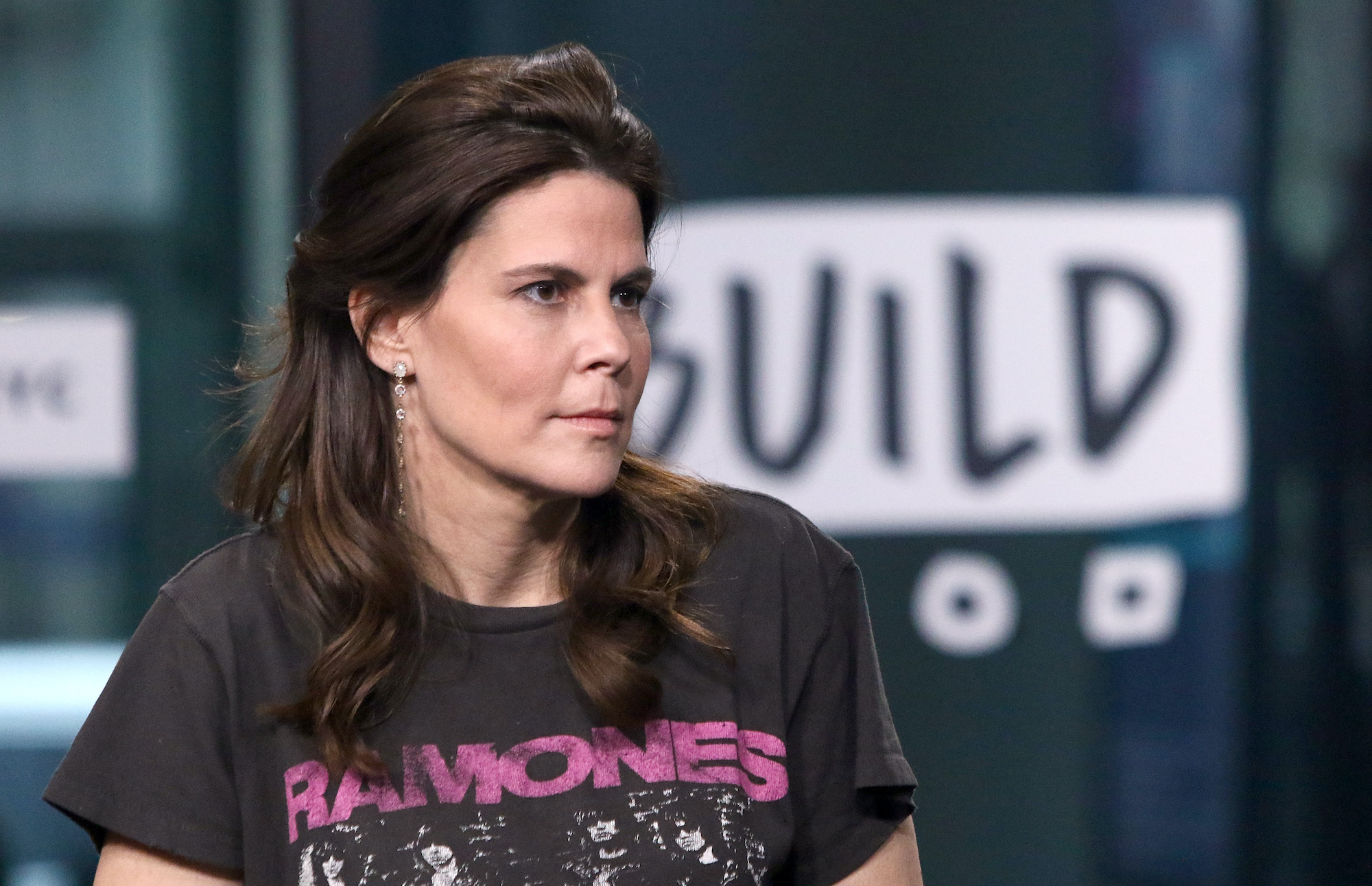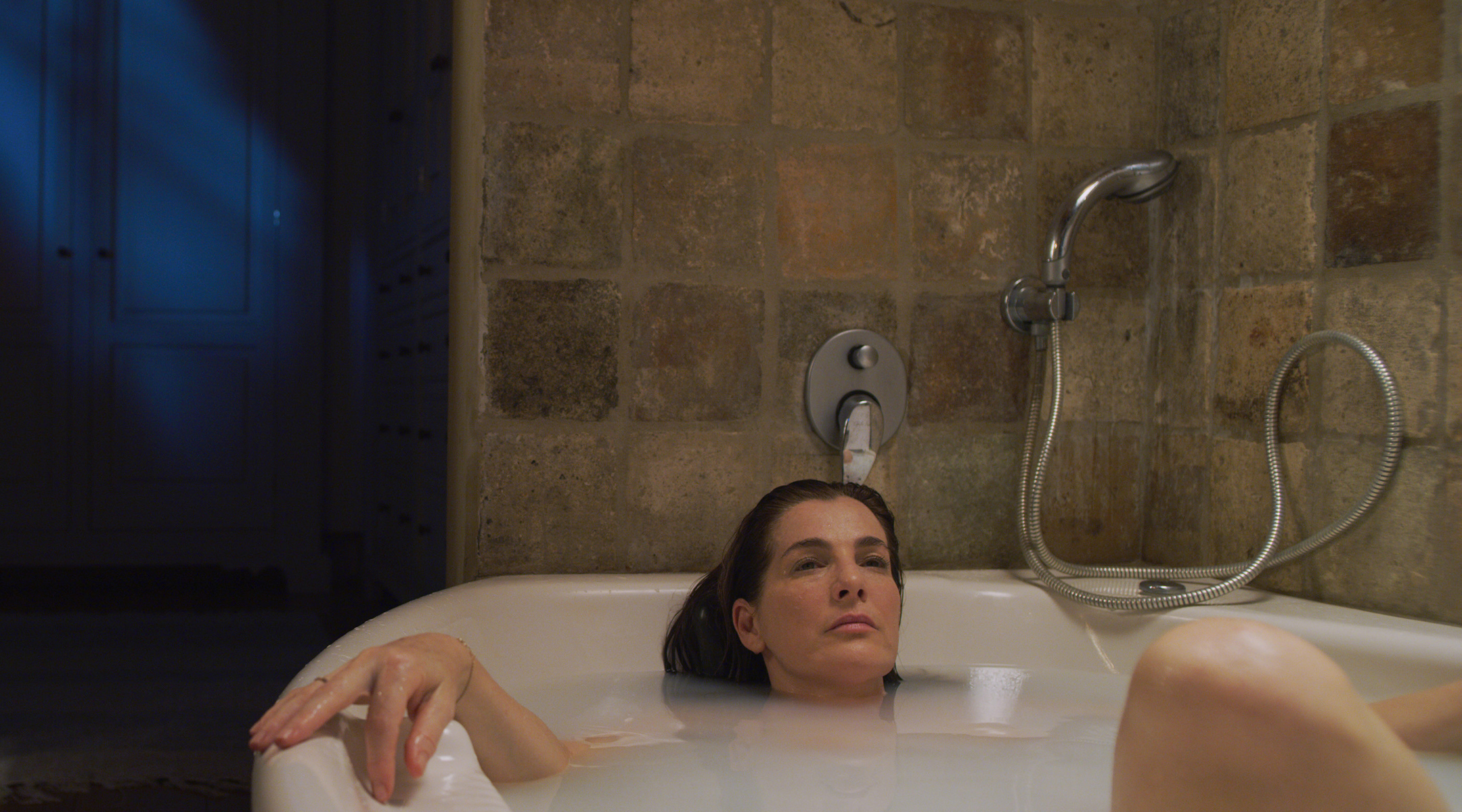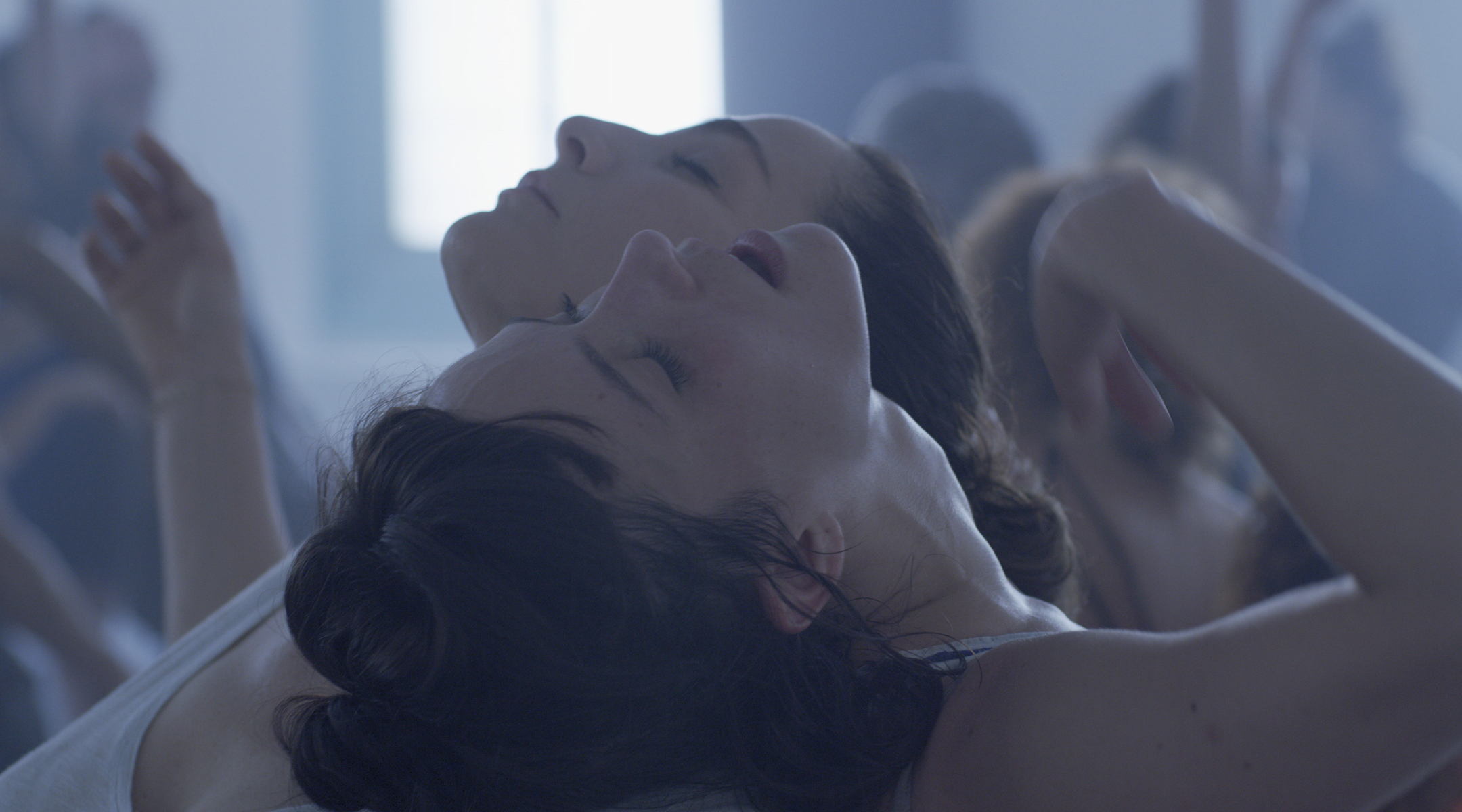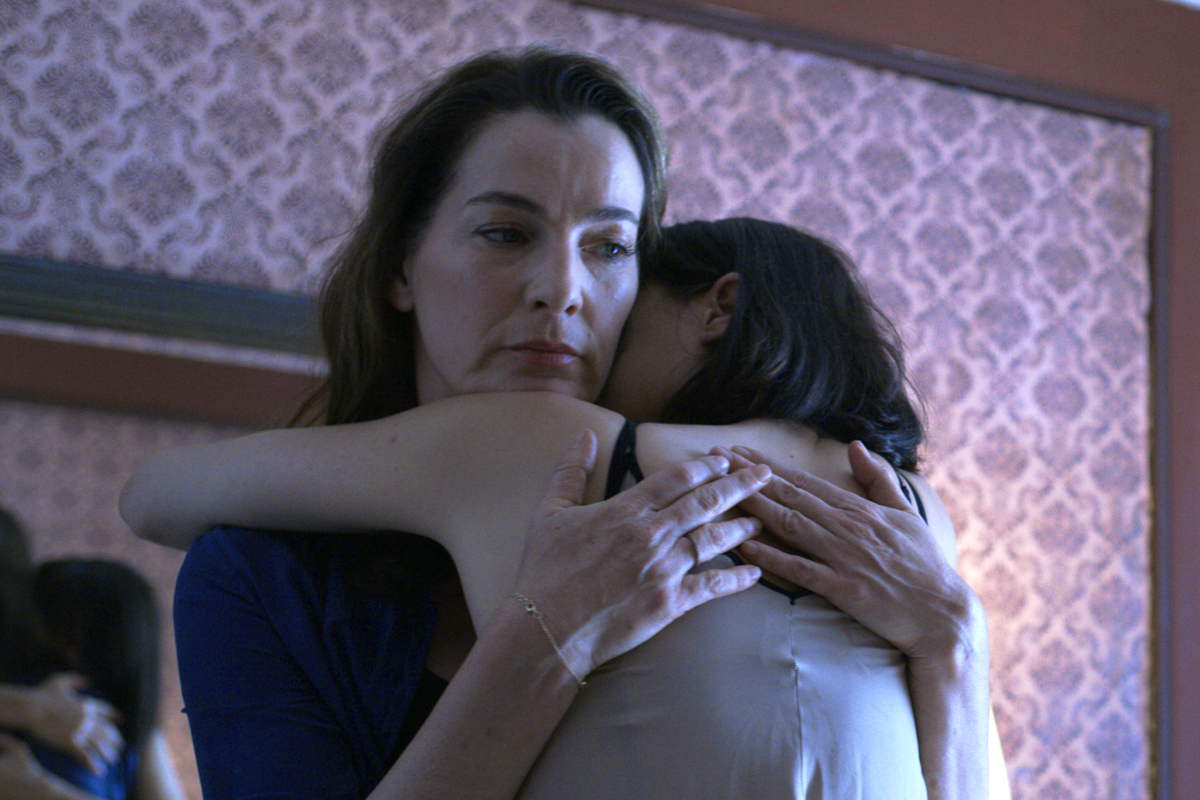Losing Alice, the latest Israeli TV show available for streaming in the U.S., is not your typical Israeli show. Unlike other series exported in their original form (The Boys, Shtisel, Fauda, the list goes on), Losing Alice is not about war, politics, or religion. It’s a sizzling, female-driven psychological erotic thriller written and directed by Israeli-American Sigal Avin. Think Killing Eve (whose title is notably similar) plus Hitchcock in Tel Aviv.
Ayelet Zurer (Munich, Angels & Demons, Shtisel) plays Alice, a film director in her late 40s struggling to reclaim her professional self after having kids. On a train she meets Sophie (played by Lihi Kornowski), an uninhibited screenwriter in her 20s, and a mutual fascination takes root. The line between reality and fiction blurs when Alice decides to direct Sophie’s screenplay — which, like Losing Alice itself, is an erotic psychological thriller. Alice’s movie star husband (Gal Toren), who is starring in the film, is not happy his wife will be directing him. Twisted, sexually-charged power dynamics ensue.
No TV newcomer, Avin has created, written, and directed projects in both Israel and the U.S., including the hit Israeli TV comedy series Irreversible (“Bilti Hafich”), and 2018’s That’s Harassment — based on her Israeli version “ZeMatrid” — a series of short films that show what sexual harassment looks like in real life (its all-star cast includes David Schwimmer, Emmy Rossum, Harry Lennix, and Zazie Beetz).

I talked to Sigal Avin about Losing Alice, which aired on the Israeli network HOT last June and whose final episode was released in the U.S. on Apple TV+ in February. While Zooming from her home in Tel Aviv and mine in Brooklyn, we talked about the female gaze, Hitchcock, and female characters living by their own rules.
The following has been edited for length and clarity.
This show was so different, so refreshing. For one thing, unlike most Israeli shows streamed in the States, it wasn’t about Mossad, the conflict, or religion. What kinds of hurdles did you face in selling the show in Israel and abroad?
It’s true, it is different. I’m getting really surprising reactions. Here in Israel, some people are telling me that this is actually the most Israeli show they’ve seen because they’re seeing something they can really identify with.
Selling it went pretty smoothly. Dori Media and the people on the production side really believed in the idea and the story from the first moment they heard about the train scene. [The Israeli network] HOT was really happy about the female leads, and Apple TV loved the concept. It’s not one of those stories where you’re going around for five years trying to sell the idea. I was really lucky that I was trusted. The story is so strange and different and I really got the creative freedom to explore it in the way I wanted to, which I’m very thankful for.
I’m happy to hear that. Women writer-directors are even less common in Israel than they are in the U.S.
The longlist nominations for the Israeli Academy of Film and Television Awards (the Israeli Emmy’s) just came out. In both the drama and comedy categories — that’s about 20 shows total — I’m the only woman director. The only one.
Wow. There are so many parallels with the show’s story, which is about a woman directing a psychological thriller. Alice, the more restrained character, and Sophie, the femme-fatale young screenwriter, are such an incredible duo. Alice is really tied to her life of responsibility and motherhood; she’s a really warm mom and I think that that’s such an interesting part of who she is. How did these characters come to you? Were you inspired by other famous pairs of characters?
I’m very inspired by female-centered series and films. We’re seeing more and more amazing female characters on the screen — Fleabag, Big Little Lies, Insecure, The Morning Show… The movies Thelma and Louise and All About Eve inspired me very, very much. I wanted to write something that I could relate to, that could be real but also shows a heightened reality — something a bit above life. I wanted it to be very grounded, to show the small nuances between husband and wife and the power balance between them, and the certain urges that come with age, of being torn between family life and career. People fearing, maybe this is it, maybe the best is behind us!
I hear a lot of people talking about how they have their house, their kids, they’re doing fine… He’s a star, she’s writing her script, what’s the problem? But there’s a feeling of what else is there? So I took those inspirations and inspiration from film noir and the erotic thrillers of the ‘90s that I grew up on and I switched the male gaze in those to the female gaze, which I was very interested in.

I was just about to ask about the female gaze! I’m a huge Hitchcock fan. The show has so many nuanced connections to Hitchcock — he was a male director, famous for his obsession with his actresses. Many of his movies are about looking, about voyeurism, about the male gaze. Rear Window, for example. That’s so present in this show, but flipped — Alice, the female director, is obsessed with Sophie. When Alice looks at Sophie, she wants to be her or to be changed by her. Was the female gaze something you were conscious of?
Yes! I’m also a big Hitchcock fan. And like Sophie’s character says, I also saw Hitchcock much too young. My father is a cinephile and we watched all the classics, both film and television. I think my love for cinema is from him. When we moved to Israel we were the only people with a huge satellite in the garden so he could get channels from all over the world. So yes, while writing the script there were a lot of things inspired by Hitchcock, by Lynch. A lot of voyeurism, a lot of mirrors, of reflections. Even Zichron Yaakov, where Alice and her husband live, is on a mountain between Haifa and Tel Aviv. I was imagining the swirling road as being kind of like Vertigo.
The star actresses, Ayelet Zurer and Lihi Kornowski, are sensational. What was the casting process like?
I’m very fortunate to have found these brilliant, brilliant actresses. And to have such trust from your actors is amazing. I believe it makes anything possible. Lihi came in on the first day of auditions for Sophie, when I was still writing. It was like magic. I was shocked, I was like, this is Sophie. So even subconsciously I was already kind of writing her into the last episodes.
With Alice, it was very difficult. Israel’s best actresses came in to audition for Alice and some of them were truly amazing. But something was missing — the chemistry with Lihi. Sometimes they had a mother-daughter chemistry and that’s not the chemistry I wanted.
Ayelet Zurer was overseas and didn’t want to audition on Skype. But then it was Passover and sometimes over Passover people are in Israel visiting family, so I texted her and she happened to be in Israel and she came in to read with Lihi. And the moment she came in and they did it together, it was like, that’s what it’s supposed to be. Ayelet had the strength Alice needs as a director, but there was something so vulnerable and sensitive too. She’s an amazing actress. When I saw them together I felt like I could watch them forever.
One of the themes of this show is what is fiction and what isn’t? It’s reflected in this question that is repeated a lot at the beginning of the show — everyone asking Sophie where the script she wrote came from and whether it was based on her real life. And so I feel like it’s fitting for me to ask you the same thing: Where did this come from? Is it based on your real life?
The Bad Reader question.
The Bad Reader question, exactly! [In the series, a character references this phrase taken from the Amos Oz book A Tale of Love and Darkness: the Bad Reader is the one who assumes fiction is always based on fact, who wants to know the origin of every story.]
Obviously it’s very personal. I write a lot out of fear. I tend to use things that I have anxiety about or that I’m afraid of and kind of write them. That’s the best medicine for me. Everything becomes better after I write. That’s something I asked myself a lot: What’s reality and what’s not? The show deals with subjectivity and objectivity — it’s all about that. You know, we could finish this interview and you can go off and say oh that was a great interview and I can go off and think oh that was awful, I said all the wrong things. So I think it’s very interesting when you take that and touch on deeper things.
I used those fears and differences — a person can see something different from what the reality really is in that moment. And as an artist, I think you sometimes have to push your imagination to go all the way, to see what is the worst or best thing that can happen. Close friends who saw the show in Israel said, “This is amazing, but you’re crazy!” When my husband was watching one of the episodes and had tears in his eyes, he said, “This is brilliant, but my darling! You went so far! Where did you go?!”

I feel like this is the core of the female gaze for me. We’re all in this subjective world, and you as the writer-director-creator were able to go all out with your full, subjective vision.
I really went deep. This show was done very quickly because I couldn’t stay there any longer! I went so deep and so dark that at a certain point, I thought I have to make this and get it out of my system. I was in it for good and for bad. I couldn’t wait to come down to my office and go into the computer and see where the characters were going to take me next because I really let myself not know. I created these very solid, interesting characters full of flaws, which I love. I wanted to see women’s flaws.
I’m really enjoying what’s happening right now: We’re allowing more women’s flaws on screen. The feminist revolution won’t be complete until we see all those flaws, until we have women who can be selfish, full of rage, jealous. They can be villains. Sometimes I see men, watching a female character doing something and they’re… [She makes a freaked out face]. If a male protagonist were doing it, it would be considered sexy or cool! So I wanted to bring that to the screen. I wanted Alice to be somebody who can selfishly want things and not because she has to provide or because her life depends on it. I mean, her life does depend on it, but just because her inner self needs those things.
So yes, all those things are from a very personal place. I really enjoyed the process: letting myself go deeper and deeper. Sometimes my husband would come into the office and it was almost like being caught! Like, there’s a lot going on in here right now, you gotta leave the room!



